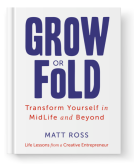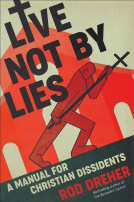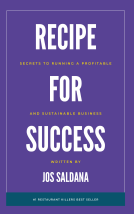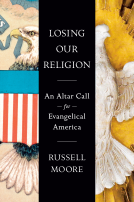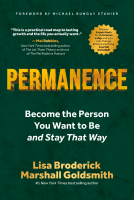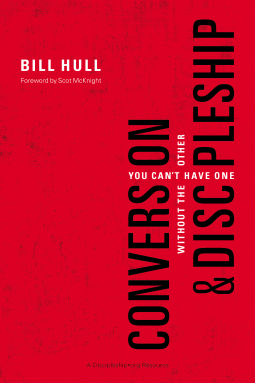
Conversion and Discipleship
You Can't Have One without the Other
by Bill Hull
This title was previously available on NetGalley and is now archived.
Send NetGalley books directly to your Kindle or Kindle app
1
To read on a Kindle or Kindle app, please add kindle@netgalley.com as an approved email address to receive files in your Amazon account. Click here for step-by-step instructions.
2
Also find your Kindle email address within your Amazon account, and enter it here.
Pub Date Jan 12 2016 | Archive Date Aug 22 2017
Zondervan Academic | Zondervan
Description
Discipleship occurs when someone answers the call to learn from Jesus how to live his or her life—as though Jesus were living it. The end result is that the disciple becomes the kind of person who naturally does what Jesus did.
How the church understands salvation and the gospel is the key to recovering a biblical theology of discipleship. Our doctrines of grace and salvation, in some cases, actually prevent us from creating an expectation that we are to be disciples of Jesus. A person can profess to be a Christian and yet still live under the impression that they don't need to actually follow Jesus. Being a follower is seen as an optional add-on, not a requirement. It is a choice, not a demand. Being a Christian today has no connection with the biblical idea that we are formed into the image of Christ.
In this ground-breaking new book, pastor and author Bill Hull shows why our existing models of evangelism and discipleship fail to actually produce followers of Jesus. He looks at the importance of recovering a robust view of the gospel and taking seriously the connection between conversion—answering the call to follow Jesus—and discipleship—living like the one we claim to follow.
Available Editions
| EDITION | Paperback |
| ISBN | 9780310520092 |
| PRICE | $18.99 (USD) |
Average rating from 7 members
Featured Reviews
 Kyle R, Reviewer
Kyle R, Reviewer
This is the first book by Bill Hull that I have read, and I really enjoyed it. His words are enlightening, thought provoking, and convicting. I felt that Hull had a real passion for making disciples throughout the world. This book is not a call to convert people, but rather to teach them to be disciples of Christ; to teach people to be more like Jesus and to spread God's Word throughout the world. This is not a book about a new program, and it is certainly not an instruction manual. It is a call to action.
This book is saturated with scripture. Hull draws largely from the teachings of Dallas Willard, Bonhoeffer, and other well known and respected scholars and theologians to illuminate his main points. One thing that is mentioned early in the book that I have noticed is that discipleship is being taken more seriously in the church today, especially among young pastors and leaders. One of my favorite pastors to listen to and read is Jack Graham. He preaches the Bible and conversion and discipleship. My other favorite is Matt Chandler. We are experiencing a culture shift among pastors. As many aging pastors begin to retire, churches often look to replace them with a younger pastor. These younger pastors have had more opportunities for advanced education and more opportunities to experience the world before being called. The problem is that they can either fully embrace discipleship training and teaching, or they can outright ignore it. As the cultural shifts and struggles persist, people are turning to the church for help and guidance. We need strong leaders and disciples in the church to guide the lost and hurting. We need a return to Christ-centered Biblical teaching in order to convert sinners and make them disciples of Christ.
For the purposes of this book, conversion is defined as when a person decides to become a Christian; discipleship occurs when someone answers the call to learn from Jesus and others how to live his or her life as though Jesus we're living it. Hull argues that "we have been conducting evangelism as a matter of conversion using a plan of salvation that is disconnected from discipleship. But you cannot have one without the other. A plan of salvation does not produce healthy disciples and is no way to build a church." Through this book you will see the picture of discipleship beyond salvation that God has planned so that all who follow might live more like Him. This book is highly recommended to all Christians. I received this as a free ARC from Zondervan on NetGalley in exchange for an honest review.
 Paul S, Educator
Paul S, Educator
Bill Hull adds another book on discipleship to a long list of books that he has already done. Bill isn’t just a writer…he is a practitioner and that makes his writing all the more valuable.
This book is an answer to the challenge posed by Dallas Willard to provide a true theology of discipleship. One that can answer key questions concerning what the Gospel, the call, and salvation really are about.
Each chapter deals with a significant aspect of discipleship (chapters 4 and 5 combined deal with the Holy Spirit and how people change.) Chapter 1 deals with the Gospel.
“If we get the gospel wrong, we get everything wrong.” And Bill makes a convincing case that many of us, have indeed, gotten the gospel wrong…whether on the right or the left. In my own church, the Gospel of Forgiveness has been preached for a long time. It is a Gospel that many are familiar with and why shouldn’t we be…it was introduced (at least in part) through people like Billy Graham and through tools like “The 4 Spiritual Laws.” Unfortunately, the problem with the Gospel of Forgiveness is that it left out things like repentance and following Christ…things essential to the Gospel that Jesus preached.
Bill makes some good points when he says, “This shift from gospel culture to salvation culture has weakened the church, diminished the lives of Christians, and made disciple-making difficult. What we should see as the starting line, our conversion to Christ, has become the finish line.”
This Gospel of Forgiveness has become so inseparable in the minds of many that if an altar call isn’t given it is assumed that the true gospel isn’t preached. I appreciated Bill’s quote by George Whitefield (a famous evangelist in England in the 18th century) when asked concerning how many conversions occurred in a meeting he reportedly answered, “I don’t know, we should know more in six months.”
“Discipleship” is a “hot-topic”, check the books being published, the seminars being sold, the mission statements being written. It is my hope, however, that it is more than a fad, because it certainly wasn’t a fad as far as Jesus was concerned. I am deeply concerned when both people in the pews and in the pulpits separate what God has put together. Hopefully, this book will be a step in the right direction in getting people to see that conversion and discipleship are a package deal.
*I received an electronic copy of the book from Zondervan in exchange for my honest opinion. I didn’t receive any other remuneration.
 T M, Reviewer
T M, Reviewer
Books of this nature seem to be springing to the forefront for a reason. For too long people were worried about getting people to pray a prayer and then leaving them to their own devices. That was never the intent of Scripture, to leave people alone to grow in their faith. Christianity was, is and always will be a community of believers. This book helps the reader understand discipleship is part of the conversion process.
 Conrade Y, Reviewer
Conrade Y, Reviewer
What is discipleship? For Dietrich Bonhoeffer, it is dying with Christ as described in his famous words: "When Christ calls a man, he bids him come and die." For the late Dallas Willard, he laments that modern evangelicalism lacks a "theology of discipleship." For many of us, we seem to treat discipleship as a separate thing from conversion. Is conversion different from discipleship? Yes. Can we have one and not the other in order to be a Christian? No. Summing up his life's passion about discipleship, Bill Hull asserts right from the start that the Christian faith requires one to have BOTH. Challenged by the late Dallas Willard to develop a theology of discipleship, Hull aims to build on his previous three other books about discipleship. This time, he is more conscientious about developing a theology of discipleship that encompasses the gospel, the call, salvation, Holy Spirit, ways & means, Church, the pastor, and the end times. It is a full treatment of essential theological subjects.
Some of us may have known Hull for his work and writings on discipleship. Hull has been a champion on all things discipleship. It is not surprising that he has even extended his passion to deal with conversion as well. Hull makes a few propositions which should make readers sit up and listen:
Conversion and discipleship are two sides to the same coin We need a theology of discipleship because only through that can we participate in God's redemptive plans We cannot separate conversion from discipleship Most of our theologies of discipleship are defective in some way but the primary defect is the unwitting separation of conversion from discipleship A theology of discipleship already exist in the Bible. We just need to pay attention and put them into practice. His conviction is that the Bible already has everything we need to know about conversion and discipleship. Hull shows us the three dimensions of salvation.
Restoration of Luther's vision of salvation Scriptural interpretation and Theological Reformulation Radical Changes with regard to doing Church.
He then applies them to eight core theological subjects. Instead of a salvation-centric gospel, we need to move to a complete gospel of Christ's work and discipleship. As far as discipleship is concerned, we are not called to a set of programs or activities but to the Person of Jesus Christ. Salvation is not mere conversion but the whole gamut of repentance, grace, forgiveness, regeneration, faith, reconciliation, redemption, and so on. Rather than to put the onus of conversion on one prayer alone, we need to be reminded about the work of the Holy Spirit in us that moves us toward true conversion. Hull lists four different understanding of the work of the Holy Spirit to show us the diversity of opinions through the main branches of Christianity. He then shows us from Scripture the four phases of transformation:
Our desires are transformed Spiritual Exercises train us We develop Christlike habits
On Church, he challenges us to move from the question: "How are you doing?" to "How are you doing loving the people God has put in your life?" He has several important correctives to our modern Church methods. Church ministries need to be shapers of disciples. Through the gospel teaching, we declare everything that Christ has done and expound on the implications. In fellowship, we must remember not to use our idealized image of community to define our gatherings. Instead, we need to learn to build our ideals in the midst of brokenness, disappointment, and disillusionment. Only when we press through them can we plow the depths of grace and love. In worship, we need to learn to downplay the significance of technology and techniques, to bring back the need for obedience and worship. The goal is consummation (union with God), not consumerism for people. On numbers, we cannot be mindlessly concerned about membership growth. We must focus our resources on the growth of disciples. Disciples are revolutionaries.
So What?
Conventional thinking about being a Christian is this: First is the phase of conversion after saying the sinner's prayer. The next steps are basically follow up and discipleship. Bill Hull argues against such thinking. Instead, he says: "Some believe you can have conversion without discipleship. I believe that the proof of conversion is discipleship." This one sentence essentially summarizes the key point in this book. Hull then goes on to show us the biblical support for such a thesis. He does this by showing us how a deficient understanding of the gospel leads to an erroneous understanding of discipleship. A "forgiveness only" gospel leads to passivity. A needs-based gospel emphasizes accommodating the gospel to culture. A prosperity gospel leads to self-entitlement. A consumer-based gospel leads to self-indulgence and addiction. A "Be right" gospel leads to detachment and theological aloofness. Finally, he reinforces Scot McKnight's King Jesus Gospel by proclaiming the need for a "Kingdom gospel." There are no two-tier levels of Christians. It's only one-tier. Either we are or we aren't.
The gospel in Christ is not simply salvation but a way of life. Hull is right. I find myself nodding each page I turn. Discipleship is the key ministry activity of the true Church of Jesus Christ. If discipleship is not taught or emphasized, we will become spiritually deficient. Perhaps, by addressing the perspective of salvation via conversion right from the start, we are called to recognize the cost of discipleship and not merely the cosmetics of conversion. It is nice to get people to become Christians via a short prayer. It is also nice to see numerical growth. Yet, most important is the need to follow Christ not just at the beginning, but all the way. This is something that Hull is passionate about. This is something all pastors and leaders of the Church must be concerned about. This is something that we must all remember, for if we call ourselves Christians, then we must be Christ-followers. The synonym for this is discipleship. Great book!
Rating: 5 stars of 5.
conrade This book is provided to me courtesy of Zondervan Academic and NetGalley in exchange for an honest review. All opinions offered above are mine unless otherwise stated or implied.
Readers who liked this book also liked:
Harold Earls, IV; Rachel Earls
Biographies & Memoirs, Parenting, Families, Relationships
Lisa Broderick and Marshall Goldsmith
Business, Leadership, Finance, Nonfiction (Adult), Self-Help



